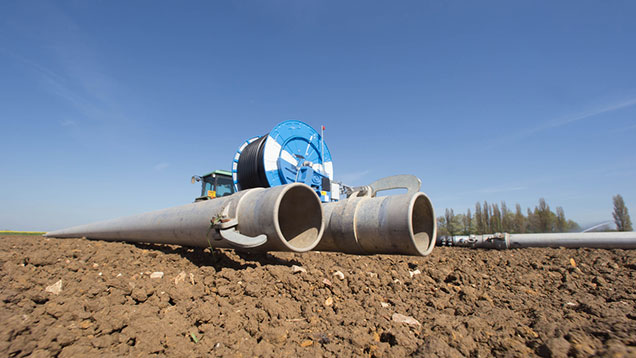Lack of planning ‘threatens water security’ for UK farms
 © Tim Scrivener
© Tim Scrivener Poor planning could leave UK farmers without enough water to produce food for a growing world population, says a report.
A long-term strategy is vital to protect food and water supplies for the future, said the UK Water Partnership (UKWP) study.
See also: April was fifth sunniest on record
Extreme weather – including floods and drought – will have an increasing impact on agriculture and water availability, it warned.
The partnership brings together scientists, policy experts and industry specialists to co-ordinate research and initiatives concerned with UK and global water security.
Long-term planning must address changes in water usage and availability both here and overseas, said the study.
“This needs to involve better predictive ability from academics and government, better management from land managers and better management strategies for the future along the supply chain.
“Public policy can provide key incentives to build resilience.”
Planning permission
Speeding up the planning permission process could help improve water security – it can take up to 10 years to obtain the go-ahead to build a public water supply reservoir.
“Not recognising the timescales involved could result in poor decisions for the future,” said the study.
Climate change is an increasingly stark challenge for producers in the UK and abroad, the report warned.
Changes in the availability of products sourced by retailers overseas poses risks for the UK supply chain, the study said.
Effective management
In East Anglia, one of Britain’s driest region’s, the Country Land and Business Association (CLA) has described as a pressing priority the need for farmers and landowners to manage water effectively.
“Effective management of water is high on the agenda for farmers and landowners – not just this year, but for the long term.”
Ben Underwood, CLA
CLA eastern region director Ben Underwood said: “Effective management of water is high on the agenda for farmers and landowners – not just this year, but for the long term. They will want have more control and be able to conserve it effectively for the benefit of agriculture and nature.”
Long periods of drought and high temperatures would lead to a reduction in summer river flows, severely restricting the availability of water for food production, said Mr Underwood.
This would have a devastating economic impact on agricultural businesses.
“It needs to be easier to build a reservoir, as they can help ensure crops are irrigated throughout the worst droughts.
“They are an essential part of the farmer’s toolkit for securing water and from an ecosystem services perspective they also provide storage in times of flooding.”
The Met Office has also warned of a clear warming trend relating to global climate.
Data from the University of East Anglia’s Climatic Research Unit and the Met Office shows that last year was 0.56C above the long-term average – and the joint warmest year on record with 2010.
